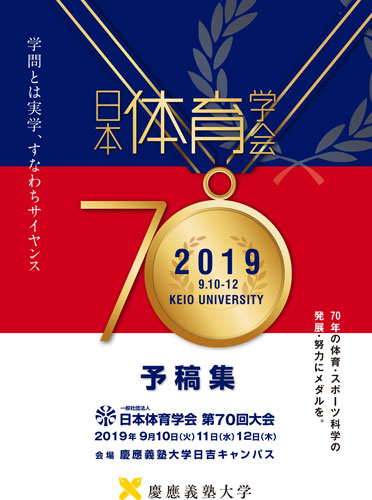Current issue
Displaying 51-100 of 855 articles from this issue
-
Pages 36_1
Published: 2019
Released on J-STAGE: December 20, 2019
Download PDF (2143K) -
Pages 36_2
Published: 2019
Released on J-STAGE: December 20, 2019
Download PDF (2143K) -
Pages 37_1
Published: 2019
Released on J-STAGE: December 20, 2019
Download PDF (2070K) -
Pages 37_2
Published: 2019
Released on J-STAGE: December 20, 2019
Download PDF (2070K) -
Pages 38_1
Published: 2019
Released on J-STAGE: December 20, 2019
Download PDF (2074K) -
Pages 38_2
Published: 2019
Released on J-STAGE: December 20, 2019
Download PDF (2074K)
-
Pages 39_1
Published: 2019
Released on J-STAGE: December 20, 2019
Download PDF (1858K)
-
Pages 39_2
Published: 2019
Released on J-STAGE: December 20, 2019
Download PDF (1858K) -
Pages 40_1
Published: 2019
Released on J-STAGE: December 20, 2019
Download PDF (2074K) -
Pages 40_2
Published: 2019
Released on J-STAGE: December 20, 2019
Download PDF (2074K) -
Pages 41_1
Published: 2019
Released on J-STAGE: December 20, 2019
Download PDF (2141K)
-
Pages 41_2
Published: 2019
Released on J-STAGE: December 20, 2019
Download PDF (2141K)
-
Pages 42_1
Published: 2019
Released on J-STAGE: December 20, 2019
Download PDF (2141K) -
Pages 42_2
Published: 2019
Released on J-STAGE: December 20, 2019
Download PDF (2141K) -
Pages 43_1
Published: 2019
Released on J-STAGE: December 20, 2019
Download PDF (2071K) -
Pages 43_2
Published: 2019
Released on J-STAGE: December 20, 2019
Download PDF (2071K) -
Pages 43_3
Published: 2019
Released on J-STAGE: December 20, 2019
Download PDF (2071K)
-
Pages 44_1
Published: 2019
Released on J-STAGE: December 20, 2019
Download PDF (2143K) -
Pages 44_2
Published: 2019
Released on J-STAGE: December 20, 2019
Download PDF (2143K) -
Pages 45_1
Published: 2019
Released on J-STAGE: December 20, 2019
Download PDF (2070K) -
Pages 45_2
Published: 2019
Released on J-STAGE: December 20, 2019
Download PDF (2070K)
-
Pages 46
Published: 2019
Released on J-STAGE: December 20, 2019
Download PDF (1859K)
-
Pages 47_1
Published: 2019
Released on J-STAGE: December 20, 2019
Download PDF (2139K) -
Pages 47_2
Published: 2019
Released on J-STAGE: December 20, 2019
Download PDF (2139K) -
Pages 48_1
Published: 2019
Released on J-STAGE: December 20, 2019
Download PDF (2073K) -
Pages 48_2
Published: 2019
Released on J-STAGE: December 20, 2019
Download PDF (2073K)
-
Pages 49_1
Published: 2019
Released on J-STAGE: December 20, 2019
Download PDF (2139K) -
Pages 49_2
Published: 2019
Released on J-STAGE: December 20, 2019
Download PDF (2139K) -
Pages 50_1
Published: 2019
Released on J-STAGE: December 20, 2019
Download PDF (2074K) -
Pages 50_2
Published: 2019
Released on J-STAGE: December 20, 2019
Download PDF (2074K)
-
Pages 51_1
Published: 2019
Released on J-STAGE: December 20, 2019
Download PDF (1675K)
-
Pages 51_2
Published: 2019
Released on J-STAGE: December 20, 2019
Download PDF (1675K) -
Pages 52_1
Published: 2019
Released on J-STAGE: December 20, 2019
Download PDF (2073K) -
Pages 52_2
Published: 2019
Released on J-STAGE: December 20, 2019
Download PDF (2073K) -
Pages 53
Published: 2019
Released on J-STAGE: December 20, 2019
Download PDF (2066K)
-
Pages 54_1
Published: 2019
Released on J-STAGE: December 20, 2019
Download PDF (2143K) -
Pages 54_2
Published: 2019
Released on J-STAGE: December 20, 2019
Download PDF (2143K) -
Pages 55_1
Published: 2019
Released on J-STAGE: December 20, 2019
Download PDF (2069K) -
Pages 55_2
Published: 2019
Released on J-STAGE: December 20, 2019
Download PDF (2069K)
-
Pages 56
Published: 2019
Released on J-STAGE: December 20, 2019
Download PDF (1858K)
-
Pages 57
Published: 2019
Released on J-STAGE: December 20, 2019
Download PDF (1673K)
-
Pages 58_1
Published: 2019
Released on J-STAGE: December 20, 2019
Download PDF (2143K) -
Pages 58_2
Published: 2019
Released on J-STAGE: December 20, 2019
Download PDF (2143K) -
Pages 59_1
Published: 2019
Released on J-STAGE: December 20, 2019
Download PDF (2070K) -
Pages 59_2
Published: 2019
Released on J-STAGE: December 20, 2019
Download PDF (2070K)
-
Pages 60_1
Published: 2019
Released on J-STAGE: December 20, 2019
Download PDF (1678K)
-
Pages 60_2
Published: 2019
Released on J-STAGE: December 20, 2019
Download PDF (1678K) -
Pages 61_1
Published: 2019
Released on J-STAGE: December 20, 2019
Download PDF (2070K) -
Pages 61_2
Published: 2019
Released on J-STAGE: December 20, 2019
Download PDF (2070K)
-
Pages 62_1
Published: 2019
Released on J-STAGE: December 20, 2019
Download PDF (1959K)
